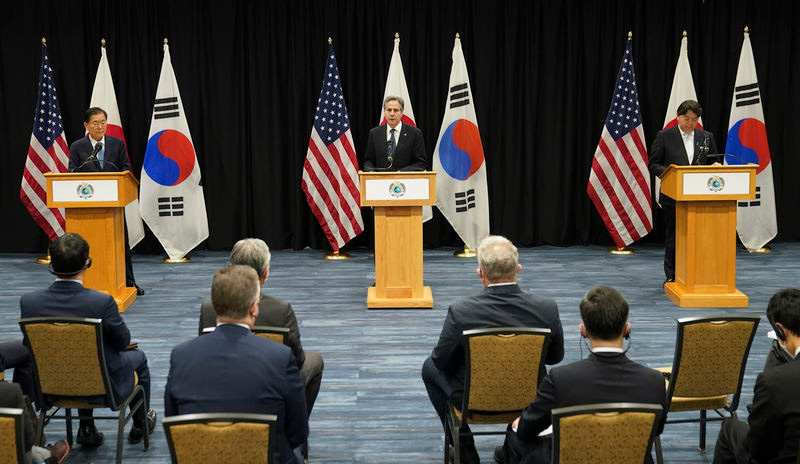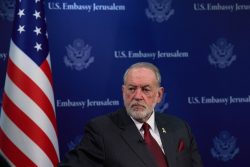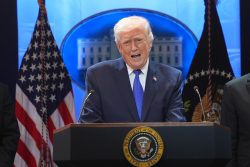
U.S. Secretary of State Antony Blinken, center, speaks during a joint press availability with South Korean Foreign Minister Chung Eui-yong, left, and Japanese Foreign Minister Yoshimasa Hayashi following their meeting in Honolulu on Saturday.
15:46 JST, February 13, 2022
HONOLULU (AP) — U.S. Secretary of State Antony Blinken met his Japanese and South Korean counterparts Saturday in Hawaii to discuss the threat posed by nuclear-armed North Korea after Pyongyang began the year with a series of missile tests.
Blinken said at a news conference after the meeting that North Korea was “in a phase of provocation” and the three countries condemned the recent missile launches.
“We are absolutely united in our approach, in our determination,” Blinken said after his talks with Japanese Foreign Minister Yoshimasa Hayashi and South Korean Foreign Minister Chung Eui-yong.
He said the countries were “very closely consulting” on further steps they may take in response to North Korea, but didn’t offer specifics.
The three released a joint statement calling on North Korea to engage in dialogue and cease its “unlawful activities.” They said they had no hostile intent toward North Korea and were open to meeting Pyongyang without preconditions.
Hayashi later told Japanese reporters the three ministers had “very fruitful” discussion on the North. He declined to give details on additional measures they may take.
North Korea has a long history of using provocations such as missile or nuclear tests to seek international concessions. The latest tests come as the North’s economy, already battered by decades of mismanagement and crippling U.S.-led sanctions, is hit hard by pandemic border closures.
Many see the tests as an attempt to pressure U.S. President Joe Biden’s administration into easing the sanctions. The Biden administration has shown no willingness to do so without meaningful cuts to the North’s nuclear program, but it has offered open-ended talks.
North Korea has rebuffed U.S. offers to resume diplomacy, saying it won’t return to talks unless Washington drops what it says are hostile polices. The North bristles at both the sanctions and regular military exercises the U.S. holds with South Korea.
Blinken arrived in Hawaii from Fiji, where he met with Acting Prime Minister Aiyaz Sayed-Khaiyum and other Pacific leaders to talk about regional issues, especially the existential risk posed by climate change. It was the first visit by a U.S. secretary of state to Fiji since 1985.
He started his Pacific tour in Australia, where he met his counterparts from Australia, India and Japan. The four nations form the “Quad,” a bloc of Indo-Pacific democracies that was created to counter China’s regional influence.
Hayashi and Chung held a separate bilateral meeting Saturday for about 40 minutes before seeing Blinken. Japan’s Foreign Ministry said they reaffirmed the importance of cooperating together and with the United States to respond to North Korea and to achieve regional stability.
The ministry said they also “frankly” exchanged views on ongoing disputes between the two countries.
Chung proposed the two countries accelerate diplomacy to find solutions to the disagreements, South Korea’s Foreign Ministry said in a statement.
Blinken also met separately with Chung. He met Hayashi earlier this week in Australia.
Top Articles in News Services
-

Survey Shows False Election Info Perceived as True
-

Prudential Life Expected to Face Inspection over Fraud
-

Hong Kong Ex-Publisher Jimmy Lai’s Sentence Raises International Outcry as China Defends It
-

Japan’s Nikkei Stock Average Touches 58,000 as Yen, Jgbs Rally on Election Fallout (UPDATE 1)
-

Trump Names Former Federal Reserve Governor Warsh as the Next Fed Chair, Replacing Powell
JN ACCESS RANKING
-

Japan PM Takaichi’s Cabinet Resigns en Masse
-

Japan Institute to Use Domestic Commercial Optical Lattice Clock to Set Japan Standard Time
-

Israeli Ambassador to Japan Speaks about Japan’s Role in the Reconstruction of Gaza
-

Man Infected with Measles Reportedly Dined at Restaurant in Tokyo Station
-

Videos Plagiarized, Reposted with False Subtitles Claiming ‘Ryukyu Belongs to China’; Anti-China False Information Also Posted in Japan

























